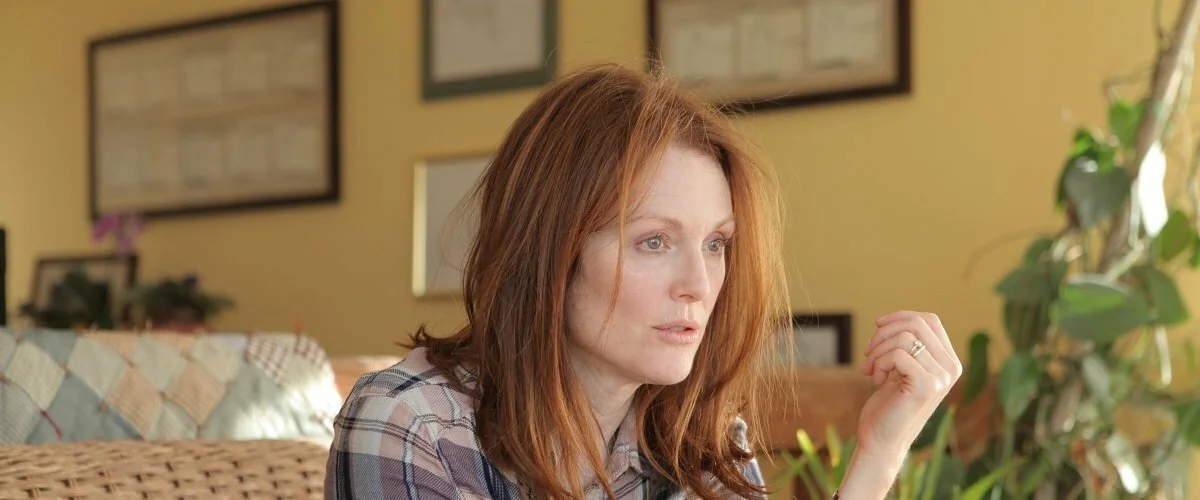Author: Sydney Reade
Sometimes, a little independent film comes out of nowhere and really makes a statement – even if it isn’t a very good movie. This is how I would characterize Still Alice.
My description of the film will be short, because it is fatally lacking in plot and a realistic timeline of events. Dr. Alice Howland (Julianne Moore) is a professor of linguistics at Columbia University when she discovers that, as a middle-aged woman, she has early-onset Alzheimer’s disease. Her husband, John, (Alec Baldwin) does cancer research; her son, Tom, (Hunter Parrish) is a medical doctor; her daughter, Lydia, (Kristen Stewart) is an aspiring actress; and her oldest daughter, Anna, (Kate Bosworth) is a lawyer pregnant with twins. I mention all this because Alice’s disease is genetic; it affects her family’s incredibly accomplished and well-planned lives even more than this sort of disease usually does – because of the possibility that her children (and grandchildren) might have it, too.
For just under two hours (short for a feature length film), the audience sees Alice fall into an accelerated decay that feels unnatural. They watch as John becomes increasingly frustrated and makes plans to move to Minnesota to continue his research, despite his wife’s condition, which feels abnormally hard of him given the impression that they’ve only been dealing with the disease for a year. The viewer watches as Alice’s family deals with the injustice of the disease robbing them of a mother and wife at such a young age only superficially. With the exception of Lydia, the children float in and out of the picture only as it becomes necessary to remind us that they exist. Perhaps the book the movie is based on is more rounded out.

blogs.indiewire.com
Julianne Moore saves this otherwise unsatisfying film. Moore has a magnetic relationship with the camera; every nuance of her acting is captured exquisitely as she portrays a woman in great crisis with an incredibly dynamic flair. She’s beautiful and elegant, even in the face of her disease, making her decline all the more gut wrenching to watch. She also conveys the brilliance of Alice as an academic without making her seem snooty. Her character remains lovable because she always puts her family first, even when she is the one who needs care. Through her portrayal of the destruction of such a likeable person, Moore succeeds in making this film a must-watch; without her ability to bring Alice to life in the way that she does, this film really could have fallen flat with no redeeming qualities to bolster its reputation.
To their credit, the “children” in this movie actually do quite well with their limited screen time. Hunter Parrish barely factors in, but Kate Bosworth does a wonderful job exhibiting fear for herself and her mother with a restrained air that felt authentic. Kristen Stewart, in her typically acerbic way, plays the rebellious child well, if safely. Alec Baldwin’s performance is nothing to write home about, but he’s not terrible to watch.
Towards the end of the film, viewers may feel as though they are waiting for something to happen, for all the medical jargon and strife to pay off in some hospital emergency that saves Alice’s life. The only really tense moment of the film is when Alice, far in the depths of her disease, finds a video file on her computer she made while still lucid, giving her later self instructions on how to commit suicide. For a good few minutes, the audience thinks, “Maybe this is it. Maybe this is the satisfying end we’ve waited for, where Alice goes out on her own terms”. Unfortunately, this is not the case, but the film does end with some poetic justice about the meaning of love.
The real magic of Still Alice comes hours or even days after viewing. It’s one of those stories that sticks with you, surreptitiously rattling around in your brain to drive home its meaning. In this case, it is Moore’s magnetism that remains, playing over and over until all the nuances of the film become clear. She so deserved her Oscar for Best Actress, for she carried this movie beyond the screen, something only a handful of all-time greats are able to accomplish.



















